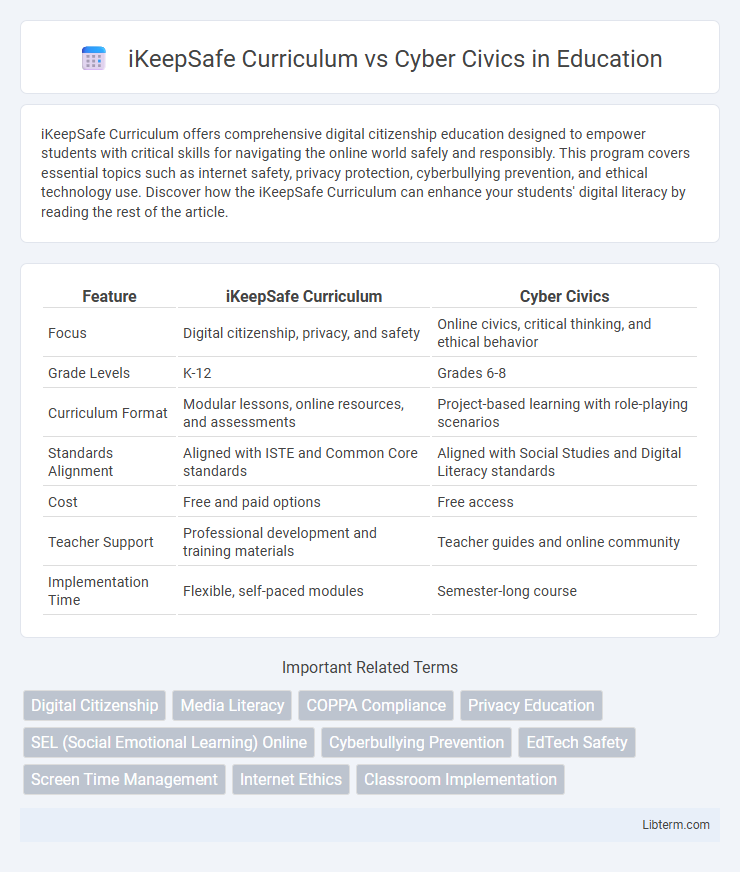iKeepSafe Curriculum offers comprehensive digital citizenship education designed to empower students with critical skills for navigating the online world safely and responsibly. This program covers essential topics such as internet safety, privacy protection, cyberbullying prevention, and ethical technology use. Discover how the iKeepSafe Curriculum can enhance your students' digital literacy by reading the rest of the article.
Table of Comparison
| Feature | iKeepSafe Curriculum | Cyber Civics |
|---|---|---|
| Focus | Digital citizenship, privacy, and safety | Online civics, critical thinking, and ethical behavior |
| Grade Levels | K-12 | Grades 6-8 |
| Curriculum Format | Modular lessons, online resources, and assessments | Project-based learning with role-playing scenarios |
| Standards Alignment | Aligned with ISTE and Common Core standards | Aligned with Social Studies and Digital Literacy standards |
| Cost | Free and paid options | Free access |
| Teacher Support | Professional development and training materials | Teacher guides and online community |
| Implementation Time | Flexible, self-paced modules | Semester-long course |
Introduction to Digital Citizenship Education
iKeepSafe Curriculum provides a comprehensive introduction to digital citizenship education, emphasizing online safety, privacy, and responsible technology use for students of all ages. Cyber Civics targets middle and high school students with a structured, interactive approach to understanding ethical behavior, digital literacy, and the impact of technology on society. Both programs focus on foundational skills necessary for navigating digital environments, but iKeepSafe offers broader age-appropriate resources while Cyber Civics integrates civic responsibility and critical thinking more deeply.
Overview of iKeepSafe Curriculum
iKeepSafe Curriculum offers a comprehensive digital citizenship program focusing on internet safety, privacy, and responsible online behavior tailored for K-12 students. It emphasizes interactive lessons, real-world scenarios, and assessments aligned with national standards to enhance students' understanding of cybersecurity and ethical technology use. The curriculum supports educators with detailed guides and resources to foster a safe, informed digital learning environment.
Overview of Cyber Civics Program
The Cyber Civics program, developed by Stanford University's Internet Observatory, offers a comprehensive K-12 curriculum designed to teach students digital citizenship skills through real-world scenarios and interactive lessons. It emphasizes critical thinking, online ethics, and responsible digital behavior, providing educators with structured resources to foster safe and respectful internet use. In contrast to iKeepSafe Curriculum, Cyber Civics prioritizes experiential learning and peer discussions to build digital literacy and cyber safety awareness.
Core Principles and Learning Objectives
iKeepSafe Curriculum emphasizes digital citizenship by focusing on online safety, privacy protection, and responsible technology use, aligning its core principles with fostering ethical behavior and critical thinking regarding digital interactions. Cyber Civics centers on empowering students to become thoughtful digital citizens through a curriculum rooted in respect, responsibility, and accountability, with learning objectives that include understanding digital law, rights, responsibilities, and communication skills. Both programs prioritize cultivating safe, respectful online environments but differ in approach, with iKeepSafe integrating compliance and security standards and Cyber Civics emphasizing social-emotional learning and civics education in digital contexts.
Grade Levels and Target Audience
iKeepSafe Curriculum is designed primarily for K-12 students, offering tailored modules that address digital citizenship and safety across elementary, middle, and high school levels. Cyber Civics targets middle and high school students, focusing on thoughtful and ethical online behavior through an interactive learning platform. Both programs aim to equip youth with essential skills for navigating digital environments responsibly, but iKeepSafe provides a broader age range coverage while Cyber Civics emphasizes critical thinking and civic engagement for adolescents.
Curriculum Content and Modules Comparison
iKeepSafe Curriculum offers comprehensive modules emphasizing digital citizenship, privacy, and online safety tailored for K-12 students, integrating interactive activities and teacher resources. Cyber Civics centers its content on critical thinking, ethical technology use, and digital responsibility through engaging lessons and real-world scenarios designed for middle and high school learners. Both curricula provide structured frameworks but differ in focus areas: iKeepSafe prioritizes privacy and safety education, whereas Cyber Civics emphasizes ethical decision-making and digital rights.
Teaching Methods and Delivery Formats
iKeepSafe Curriculum employs interactive, scenario-based lessons designed for self-paced online learning, emphasizing real-life applications and multimedia content to engage students. Cyber Civics utilizes a structured, discussion-based approach with teacher-led facilitation, incorporating video lessons, group activities, and role-playing to foster critical thinking and collaborative analysis. Both programs offer flexible formats but differ in delivery, with iKeepSafe favoring digital interactivity and Cyber Civics promoting interactive classroom dynamics.
Assessment and Evaluation Approaches
iKeepSafe Curriculum employs formative and summative assessments tailored for K-12 students, integrating quizzes, scenario-based questions, and interactive activities to measure digital citizenship comprehension and skills effectively. Cyber Civics emphasizes performance-based assessments including reflective journals, project portfolios, and peer evaluations to gauge critical thinking and real-world application of cyber ethics. Both curricula prioritize ongoing evaluation methods that support skill mastery and ethical decision-making in digital environments.
Integration with School Policies and Standards
iKeepSafe Curriculum aligns with state and national standards by providing age-appropriate digital citizenship lessons that support existing school policies on internet safety and responsible technology use. Cyber Civics integrates seamlessly with school curricula through its research-based approach, emphasizing critical thinking and ethical behavior, which complements educational standards on digital literacy and social-emotional learning. Both programs offer flexible implementation options, enabling schools to reinforce district policies while promoting a consistent culture of safe and respectful online engagement.
Choosing the Right Digital Citizenship Program
When choosing the right digital citizenship program, iKeepSafe Curriculum offers comprehensive, standards-aligned resources emphasizing privacy, safety, and ethical technology use for K-12 students. Cyber Civics delivers a project-based learning approach that cultivates critical thinking, responsible online behavior, and civic engagement through real-world digital scenarios. Evaluators should consider program alignment with educational standards, age-appropriate content, and the balance of theoretical knowledge versus practical application for effective digital citizenship education.
iKeepSafe Curriculum Infographic

 libterm.com
libterm.com